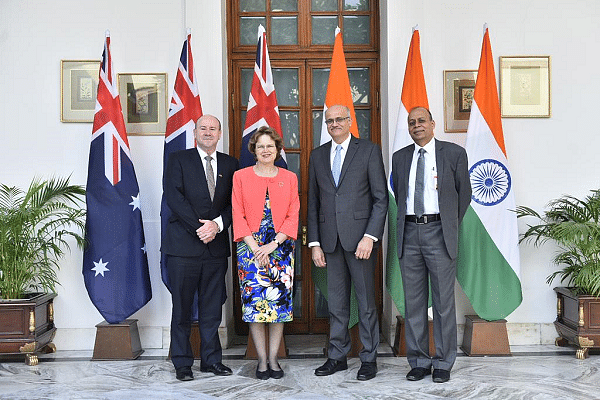
India will soon have separate agreements for sharing its military logistics with all of its three partners – United States, Japan, and Australia – in the 'Quad', an initiative the four nations re-launched a few years ago to build a bulwark against China in Indo-Pacific.
Top officials of India and Australia on Monday held the third “2+2 dialogue” in New Delhi and discussed the “prevailing regional security concerns” – ostensibly arising out of China's military aggression in Indo-Pacific.
India on November 30 last also held its first 2+2 ministerial dialogue with Japan, with Defence Minister Rajnath Singh and External Affairs Minister S Jaishankar hosting Japanese Foreign Minister Toshimitsu Motegi and Defence Minister Taro Kono. Jaishankar and Singh will join US Secretary of State Mike Pompeo and Secretarey of Defence Mark Esper in Washington D.C. for the second India-US 2+2 dialogue.
Indian and Australian officials on Monday also discussed about the possibility of inking a bilateral agreement, which would set the framework for the arrmies, navies and air-forces of India and Australia sharing military logistics. The proposed meeting between Indian and Australian Prime Ministers, Narendra Modi and Scott Morrison, in New Delhi next month is likely to see the two sides moving forward to ink the agreement, sources told the DH on Monday.
New Delhi is set to sign a similar pact – formally known as Acquisition and Cross-Servicing Agreement (ACSA) – with Tokyo, when Modi will host Japanese Prime Minister, Shinzo Abe, from December 14 to 17, possibly in a north-eastern city.
India already signed the Logistics Exchange Memorandum of Agreement (LEMOA) with United States in August 2016. Once New Delhi signs similar aggrements with Tokyo and Canberra; Indian Army, Navy and Air Force will have logistics sharing arrangements with counterparts in all the three other nations in the Quad – US, Japan and Australia.
The Quad had first come into existence in 2007 but had fizzled out soon. The four-nation initiative was re-launched in Manila in November 2017, ostensibly to counter the expansionist aspirations of China in Indo-Pacific.
The senior diplomats of the four nations had several meetings ever since the quad was re-launched. It was elevated to the level of Foreign Ministers when US Secretary of State hosted his counterparts from Japan, Australia and India on the sideline of the United Nations General Assembly in New York on September 26.
New Delhi's move to join Washington, Tokyo and Canberra to quietly add a military dimension to the “Quad” was apparently aimed at sending out a message to China, which had of late been echoing Pakistan to oppose India's August 5 decisions to strip its Jammu and Kashmir (J&K) state of its “special status” and to reorganize the state into two Union Territories.
Foreign Secretary Vijay Gokhale and Defence Secretary Ajay Kumar led the delegation of India in the 2+2 dialogue with Australia on Monday. The delegation from Canberra was led by Frances Adamson and Greg Moriarty, respectively the Secretary of the Department of Foreign Affairs and Trade and Secretary of the Department of Defence of Australian Government.
“The two sides (India and Australia) welcomed the recent progress made in deepening bilateral, political, economic, security and defence cooperation,” the Ministry of External Affairs (MEA) said in a statement issued in New Delhi after the 2+2 dialogue. “They discussed recent regional and global developments. They also exchanged views on achieving their shared objective of peace, prosperity and progress in the Indo-Pacific region.”
The issues related to bilateral defence engagements, areas to enhance cooperation in the field of defence industry and defence technology as well as “the prevailing regional security concerns” had been discussed during the 2+2 dialogue, according to a separate statement issued by the Ministry of Defence.
Australia has been expressing concern over militarization of the disputed South China Sea by China. India too has been joining US and Japan to call for a free and open Indo-Pacific – tacitly opposing maritime aggression by the communist country in the region.
